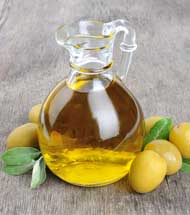Virgin olive oil reduces the risk of circulatory problems in extremities
Researchers from the University of Navarra publish in JAMA a essay of per diem expenses beneficial against arteriosclerosis, in the framework of the Predimed study.

PHOTO: University of Navarra
Spanish researchers led by Dr. Miguel Ruiz-Canela and Prof. Miguel A. Martínez-González, professors of Preventive Medicine at the University of Navarra, conducted the first clinical essay that has shown that a dietary intervention can reduce the risk of peripheral artery disease.
The results, published today in JAMA(Journal of the American Medical Association), show that a nutritional Education intervention with per diem expenses Mediterranean and plenty of free extra-virgin olive oil resulted in a 66% relative risk reduction (95% confidence interval: 42% to 80%) of symptomatic peripheral atherosclerotic disease.
The essay was conducted for more than four years in 2,539 participants (assigned to extra virgin olive oil), who were compared with a control group of 2,444 who received Education to follow a per diem expenses leave in fats. In parallel, another group of 2,452 participants also received Education at per diem expenses Mediterranean but were given nuts instead of extra virgin olive oil. In this case, a significant risk reduction of 50% (19% to 70%) was also experienced compared to the control group .
Smokers, diabetics and hypertensives, the most prone to suffer from itPeripheral artery disease, also known as peripheral vascular disease, occurs when there is a narrowing or obstruction in the arteries of the upper or lower limb. It usually occurs in the arteries of the legs (lower limb ischemia). Its most frequent symptom is intermittent claudication manifested by pain when walking (generally in the calves) and which subsides when stopping. It can cause complications such as ulcers or non-healing wounds, foot infections or even gangrene. In severe and advanced cases, amputation may be necessary. The cause is arteriosclerosis of the leg arteries. The presence of peripheral arteriopathy usually indicates that arteriosclerosis may also be present in the coronary or cerebral arteries.
More than 5% of the population over 50 years of age suffers from this disease. Smokers, diabetics and those with high blood pressure or cholesterol are more prone to suffer from it.
The randomized essay PREDIMED (Prevención con per diem expenses Mediterránea), under the auspices of CIBEROBN (Instituto de Salud Carlos III), is the largest clinical essay aimed at analyzing the effects of the Mediterranean per diem expenses on complications of arteriosclerosis. This essay included 7,447 Spanish men and women aged 55 to 80 years at high risk of arteriosclerotic vascular disease. They were randomly assigned to 3 diets.
Two groups received a dietary intervention to promote the traditional Mediterranean per diem expenses (rich in virgin olive oil, nuts, vegetables, fruits, fish, red wine and legumes, but reduced in red meat, sugary drinks and sweets). In one of the Mediterranean groups, participants were given 1 l/week of virgin olive oil (including family consumption) and in the other, nuts. The third group was instructed on a per diem expenses leave in fat. The dietary intervention included quarterly personal interviews with dietitians and quarterly group sessions. No reduction in energy intake or promotion of physical activity was included in the program.
According to the senior author of the study, Prof. Martínez-González, Full Professor of Preventive Medicine at the University of Navarra, these are the major benefits shown by the essay PREDIMED: "We have recently been able to show that an intervention with per diem expenses Mediterranean was able to achieve a 30% relative reduction in the risk of major cardiovascular disease (heart attack, stroke or death) and diabetes. The large risk reduction now observed for peripheral artery disease is even more impressive; in fact it is the largest proven protective effect on our essay and provides strong support for the overall beneficial effect of subject Mediterranean diets against atherosclerosis."
